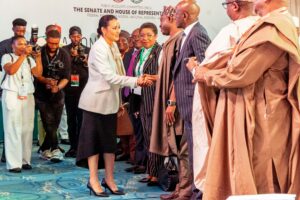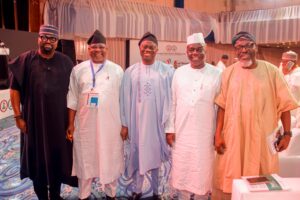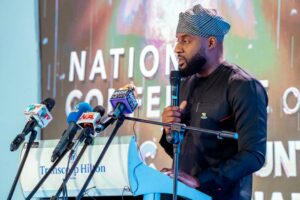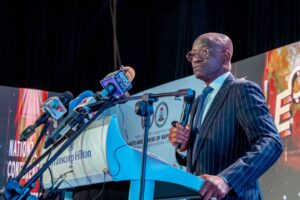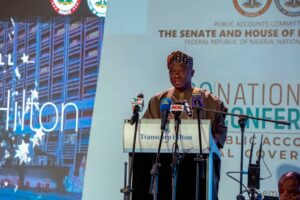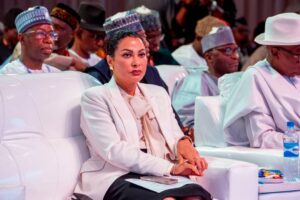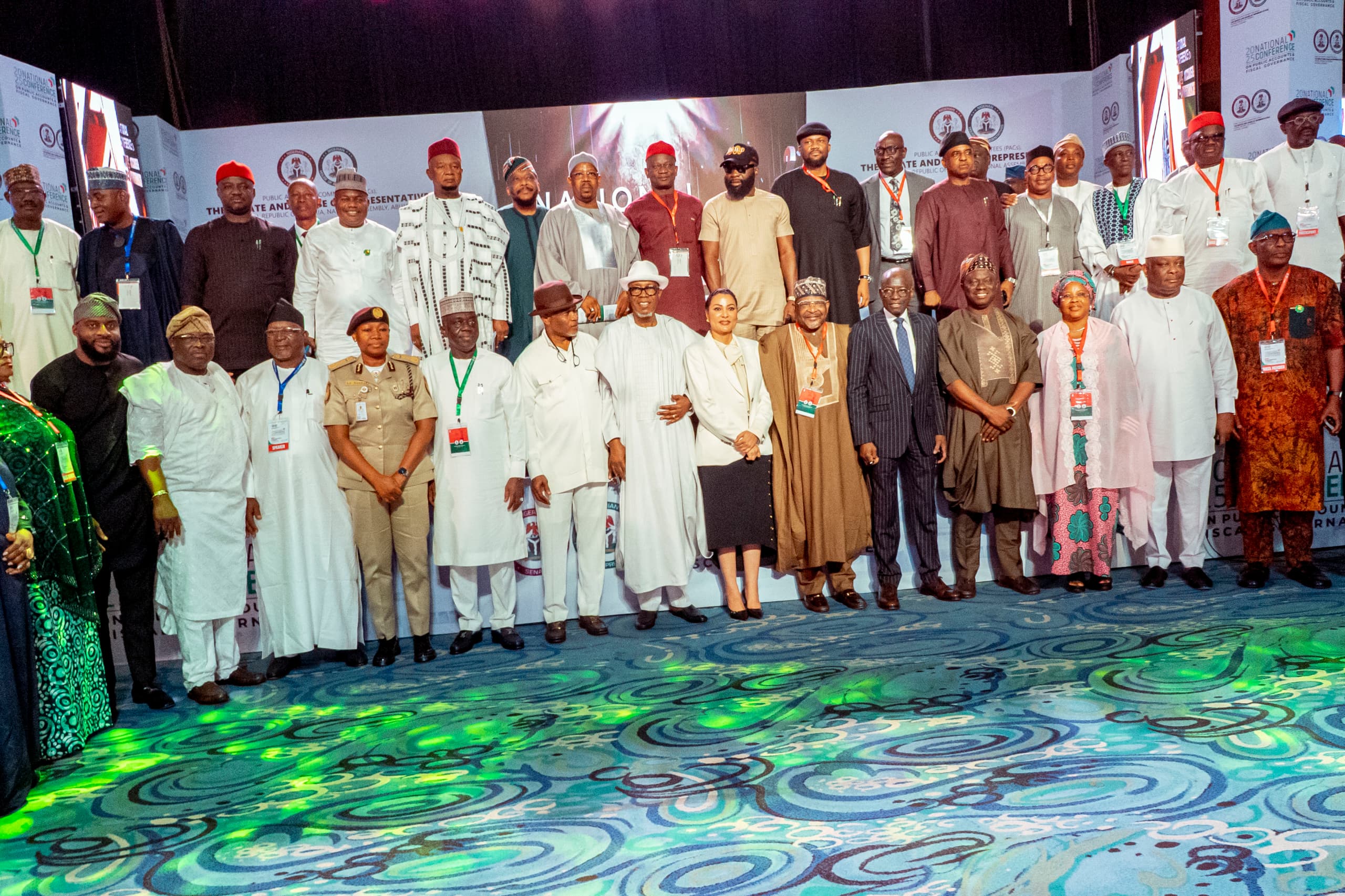
NCPAFG2025: We have redirected Subsidy funds into targeted interventions – Tinubu
Speaker Abbas Says N300 Billion in Audit Queries Still Unresolved
We must institutionalise accountability – Salam
President Bola Ahmed Tinubu has disclosed that the savings from the removal of fuel subsidies are being redirected into vital infrastructure projects nationwide.
Speaking through the Minister of State for Finance, Dr. Doris Nkiruka Uzoka-Anite, at the National Conference on Public Accounts and Fiscal Governance in Abuja, Tinubu explained that the reallocation of funds is aimed at strengthening social safety nets, implementing targeted economic reforms, and restoring public trust.
The conference, organised by the Public Accounts Committees (PACs) of both the Senate and House of Representatives, was themed: “Fiscal Governance in Nigeria: Charting a New Course for Transparency and Sustainable Development.”
Highlighting the scale of previous expenditures, the President said;
“In 2022 alone, Nigeria spent over N4 trillion on fuel subsidies—more than our capital expenditure allocation. This was not only physically unsustainable but also unjust. A subsidy that disproportionately benefited the affluent, encouraged smuggling, and bred inefficiency was neither equitable nor strategic.”
Since ending the subsidy, Tinubu said the government has invested the funds into essential sectors:
“We have redirected those funds into targeted interventions, expanding our social safety nets, improving public transportation, and financing critical infrastructure projects. Most importantly, we have strengthened our fiscal buffers, making Nigeria more resilient to external shocks.”
He called fiscal governance the “lifeblood of national development,” stressing that effective resource management, transparency, and accountability are indispensable to national prosperity.
“For far too long, Nigeria’s economy has been burdened by structural inefficiencies, fiscal leakages, and an overreliance on oil revenues. But we are not here today to dwell on the challenges of the past. We are here to chart a new course.”
Tinubu also pointed to newly signed tax reform laws aimed at streamlining compliance, broadening the tax base, digitising revenue collection, and easing the burden on businesses:
“These reforms are designed to widen the tax base by integrating the informal sector, simplify compliance for small and medium-sized enterprises, digitise revenue collection to reduce human interference and eliminate leakages, and harmonise multiple taxes to make doing business easier in Nigeria.”
He described this tax overhaul as “a governance imperative,” noting that Nigeria is transitioning toward a more diversified and inclusive revenue system, moving away from dependence on oil.
In terms of economic diversification, Tinubu listed agriculture, manufacturing, digital services, renewable energy, mining, and the creative economy as sectors now receiving focused investment and reform.
He referenced the National Credit Guarantee Company as a new initiative to empower SMEs, support domestic production, and boost non-oil exports:
“These efforts go beyond mere economic metrics. They are creating jobs, fostering innovation, building economic resilience, and strengthening our national security and long-term stability.”
On monetary policy, Tinubu noted the Central Bank’s progress in stabilising the naira and curbing inflation, citing improved coordination with fiscal authorities.
“There is better coordination now between the fiscal and monetary sides, and we are determined to reduce inflationary pressures by addressing structural bottlenecks, particularly in food supply chains.”
The President reaffirmed the importance of accountability, stating that digital platforms like IPPIS, GIFMIS, and the Open Treasury Portal are making public finance more transparent:
“These platforms ensure that public funds are traceable, public officers are accountable, and the Nigerian people are empowered with information. We must move from opacity to openness, from suspicion to confidence.”
Tinubu urged lawmakers, especially PAC members, to carry out their oversight roles with “integrity, courage, and independence,” noting:
“Oversight is not a political tool. It is a patriotic duty. Every project must be guided by value for money, and every budget must reflect the new priorities of our people.”
He emphasized that accountability also lies with citizens, media, civil society, and the judiciary.
“Nigerians must be empowered to ask questions, scrutinise public accounts, and demand accountability. Good governance is a shared responsibility.”
House of Representatives Speaker, Rt. Hon. Abbas Tajudeen, represented by House Leader Julius Ihonvbere, voiced concern over audit reports showing over N300 billion in unrecovered public funds.
“We have advocated for the timely implementation of audit recommendations and increased collaboration with anti-corruption bodies to ensure that those found wanting are held to account. We also support mandatory sanctions for audit infractions to close longstanding loopholes,” he said.
The Speaker emphasized the House’s shift from passive review to active enforcement of audit recommendations:
“Fiscal responsibility cannot thrive in the absence of consequences for mismanagement.”
To strengthen compliance, Abbas said the House has improved the PAC process and adopted mechanisms to track MDAs’ responses to audit recommendations.
He also highlighted the importance of digital tools in enhancing accountability:
“The House is fully committed to integrating technology into public sector audit and accounting processes. We have promoted real-time expenditure tracking tools and encouraged MDAs to adopt automated audit software.”
He said fiscal transparency must move beyond elite bureaucratic circles to include citizens.
“Fiscal transparency should no longer be confined to elite circles of technocrats and auditors; it must become a democratic right that empowers citizens.”
The Speaker added that every appropriation bill now includes public presentations and debates:
“The essence of inclusive budgeting is to ensure that the people whose mandate we hold have the opportunity to make input into the appropriation process.”
He called for nationwide standardisation of audit practices and more participation by state-level actors.
Senate President Godswill Akpabio, represented by Senator Abdul Ningi, encouraged PACs to fully exercise their constitutional authority, warning against the rising trend of ignoring legislative summons.
“Refusal to honour legislative invitations, especially from the PACs, is unacceptable. This trend must be stopped.”
Akpabio stressed that effective oversight is essential to national progress.
“Without accountability, there will be no prosperity. Without discipline, there will be no development.”
He acknowledged the challenges lawmakers face when overseeing large institutions like the CBN, NNPC, and FIRS, and called for improved tools and training.
“We need expertise and tools, especially digital technologies, to carry out oversight over 250 million Nigerians. The task is enormous but must be done.”
He praised the conference as a platform for practical solutions.
“This conference should go beyond theory. Let it equip our lawmakers with the capacity, knowledge, and strategy to engage in effective fiscal oversight.”
Senator Ahmed Wadada, Chairman of the Senate PAC, described fiscal governance as “the moral backbone of public service.”
“We must treat public funds not as a privilege, but as a sacred trust. And we must ensure every Naira counts—for education, health, infrastructure, security, and the future of generations unborn.”
Referencing gaps identified in recent audits, Wadada called for stronger public financial management and closer oversight.
“We are building institutional synergy across arms of government to ensure that fiscal recklessness becomes a thing of the past.”
Rep. Bamidele Salam, Chairman of the House PAC, echoed the need for measurable results from the conference.
“Making public funds work for the public good is a mantra we must not only proclaim but must be seen to internalise and practice in all we do as public servants.”
He said Nigeria’s fiscal architecture must evolve to address dwindling revenues, population growth, youth unemployment, and infrastructural deficits.
“We must combat the ills of corruption, impunity and abuse of due process in public sector financial management.”
Salam stressed that Nigeria must lead by example in Africa through better governance and fiscal transparency:
“There is no way we can achieve this if we do not make concerted, conscious efforts to recalibrate our fiscal responsibility systems.”
Hon. Medard Lubega Sseggona, President of the African Organisation of Public Accounts Committees (AFROPAC), commended Nigeria for taking continental leadership in promoting fiscal transparency and sustainable public finance management, declaring that the country now stands as a strategic anchor in Africa’s accountability architecture.
“This forum is a clear demonstration of Nigeria’s commitment to strengthening public financial management and enhancing transparency in championing sustainable development. It speaks directly to the collective challenges we face across the continent in our shared aspirations.”
He lauded the Nigerian National Assembly for refocusing attention on accountability.
“Public Accounts Committees must now sit at the centre of the survival and credibility of our democracies. Our people demand transparency. They demand that public accounts serve the public good. And as parliamentarians, we must rise to that occasion—not just with words, but through robust action and institutional reform,” he said.
He noted that Nigeria’s choice to host the forthcoming West African Association of Public Accounts Committees (WAPAC) Conference later this year underscores its growing importance as a continental standard-bearer in fiscal oversight.
“We now see Nigeria as a strategic partner and anchor in this mission, especially as we prepare for the upcoming WAPAC Conference, which Nigeria will graciously host,” he said.
Hon. Sseggona urged Nigeria and other African nations to confront a recurring governance gap: the disconnect between intention and implementation.
“For Nigeria, the challenge is not a lack of vision or policy. It is often the gap between intention and implementation. This forum presents a unique opportunity to bridge that gap,” he said.
To that end, he laid out four strategic pillars necessary to achieve genuine fiscal accountability and inclusive growth.
They are Open Budgeting and Real-Time Public Access, Strengthening Auditor Independence, Capacity Building, and Embracing Innovation.
He said digital tools such as procurement blockchain for contract management and digital audit assistants can revolutionise how we track variance and verify public expenditure.
“In public accounts, we are often referred to as post-mortem committees. But yours is a strategic institution. By ensuring fiscal transparency today, you safeguard sustainable development for tomorrow.”
He encouraged Nigerian legislators to remain “courageous in your duties, collaborative in your approach, and relentless in your pursuit of the public good.”
The Head of the Civil Service of the Federation, Mrs. Didi Esther Walson-Jack, affirmed the Civil Service’s full support for Nigeria’s ongoing fiscal reforms, describing the National Conference on Public Accounts and Fiscal Governance as a critical step toward strengthening accountability and service delivery across government institutions.
Walson-Jack said the event comes at a moment when transparency, fiscal discipline, and good governance are more urgent than ever.
